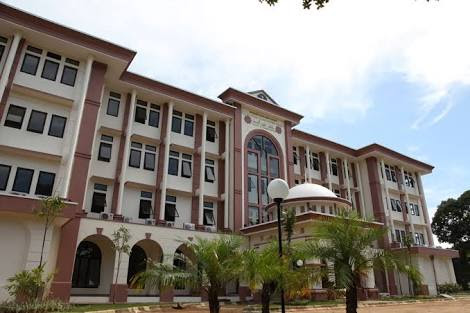GEOMETRIC TRANSFORMATION ON CARVINGS OF TORAJA TONGKONAN HOUSES
Abstract
This research aims to examine the mathematical concepts in traditional Tongkonan houses' carving and provide information about the meaning of each carving in the Tongkonan house. The research method used is the qualitative research method. The results of the study are obtained by observation and interview. The results showed that it turns out, in some Toraja carvings, contain the concept of transformational geometry, namely reflection. The information also obtained that the carvings in the Tongkonan house are very loaded with meaning, especially about advice, prayer, or hope to all members of the Tongkonan.
Downloads
References
Abdullah, A. S. (2017). Ethnomathematics in perspective of sundanese culture. Journal on Mathematics Education, 8(1), 1–16. Retrieved from https://files.eric.ed.gov/fulltext/EJ1173644.pdf.
Albanese, V., & Palacios, F. J. P. (2015). Enculturation with ethnomathematical microprojects: from culture to mathematics. Journal of Mathematics & Culture, 9(1), 1–11. Retrieved from http://nasgem.rpi.edu/files/30913.
Alqahtani, M. M., & Powell, A. B. (2016). Instrumental appropriation of a collaborative, dynamic-geometry environment and geometrical understanding. International Journal of Education in Mathematics, Science and Technology, 4(2), 72–83. https://doi.org/10.18404/ijemst.38054.
Balamurugan, M. (2015). Ethnomathematics: An approach for learning mathematics from multicultural perspective. International Journal of Modern Research and Reviews, 3(6), 716–720. Retrieved from http://journalijmrr.com/wp-content/uploads/2015/08/IJMRR175.pdf.
Blanco-Alvarez, H., & Oliveras, M. L. (2016). Ethnomathematics: A political tool for latin America. RIPEM, 6(1), 112–126. Retrieved from https://core.ac.uk/download/pdf/43009338.pdf.
Budiharso, T., & Tarman, B. (2020). Improving quality education through better working conditions of academic institutes. Journal of Ethnic and Cultural Studies, 7(1), 99–115. https://dx.doi.org/10.29333/ejecs/306.
D'Ambrosio, U. (1989). A research program and course in the history of mathematics: Ethnomathematics. Historia Mathematica, 16(3), 285–287. Retrieved from https://www.usd.ac.id/fakultas/pendidikan/s2_ pen.matematika/f1l3/An%20article%20by%20Ubiratan%20D'Ambrosio.pdf.
D'Ambrosio, U., & Rosa, M. (2017). Ethnomathematics and its pedagogical action in mathematics education. https://doi.org/10.1007/978-3-319-59220-6_12.
Evidiasari, S., Subanji, & Irawati, S. (2019). Students' spatial reasoning in solving geometrical transformation problems. IJOLAE: Indonesian Journal on Learning and Advanced Education, 1(2), 38–51. https://doi.org/10.23917/ijolae.v1i2.8703.
Hardianti, S. (2017). Etnomatematika: Aplikasi bangun datar segiempat pada Candi Muaro Jambi. AKSIOMA: Jurnal Matematika Dan Pendidikan Matematika, 8(2), 99–110. https://doi.org/10.26877/aks.v8i2.1707.
Huda, N. T. (2018). Etnomatika pada bentuk jajanan pasar di daerah istimewa Yogyakarta. JNPM (Jurnal Nasional Pendidikan Matematika), 2(2), 217–232. https://dx.doi.org/10.33603/jnpm.v2i2.870.
Jelatu, S., Sariyasa, & Ardana, I. M. (2018). Effect of geogebra-aided react strategy on understanding of geometry concept. International Journal of Instruction, 11(4), 325–336. https://doi.org/10.12973/iji.2018.11421a.
Kivkovich, N. (2015). A tool for solving geometric problems using mediated mathematical discourse (for teacher and pupils). Procedia - Social and Behavioral Sciences, 209, 519–525. https://doi.org/10.1016/j.sbspro.2015. 11.282.
Kusumah, yaya S., Kustiawati, D., & Herman, T. (2020). The effect of geogebra in three-dimensional geometry learning on students' mathematical communication ability. International Journal of Instruction, 13(2), 895–908. Retrieved from https://files.eric.ed.gov/fulltext/EJ1249074.pdf.
Lembang, S. T. (2018). Analisis kesalahan mahasiswa dalam menyelesaikan soal aljabar linier pada materi sistem persamaan linier. Jurnal Keguruan Dan Ilmu Pendidikan, 6(3), 249–256. https://doi.org/10.0901/jkip.v6i3.419.
Lembang, S. T., La’biran, R., & Kristanto. (2019). Ukiran toraja sebagai alat peraga untuk memperkenalkan bangun datar. Jurnal Keguruan Dan Ilmu Pendidikan, 8(2), 33–37. https://doi.org/10.0901/jkip.v8i2.858.
Mauluah, L., & Marsigit. (2019). Ethnomathematics for elementary student: exploration the learning resources at Kraton Yogyakarta. International Journal of Scientific & Technology Research, 8(7), 776–780. Retrieved from http://www.ijstr.org/final-print/july2019/Ethnomathematics-For-Elementary-Student-Exploration-The-Learning-Resources-At-Kraton-Yogyakarta.pdf.
Remme’, B. V., & Ba’ru, Y. (2020). Transformation geometry in Toraja carving. Daya Matematis, Jurnal Inovasi Pendidikan Matematika, 8(3), 223–228. https://doi.org/10.26858/jdm.v8i3.16209.
Retnawati, H., Arlinwibowo, J., & Sulistyaningsih, E. (2017). The students' difficulties in completing geometry items of national examination. International Journal on New Trends in Education and Their Implications, 8(4), 28–41. Retrieved from http://www.ijonte.org/FileUpload/ ks63207/File/03.heri_retnawati.pdf.
Rosa, M., & Orey, D. C. (2011). Ethnomathematics: The cultural aspects of mathematics. Revista Latinoamericana de Etnomatemática, 4(2), 32–54. Retrieved from https://dialnet.unirioja.es/descarga/articulo/3738356. pdf.
Susilawati, W., Suryadi, D., & Dahlan, J. A. (2017). The improvement of mathematical spatial visualization ability of student through cognitive conflict. IEJME: International Electronic Journal of Mathematics Education, 12(2), 155–166. Retrieved from https://www.iejme.com/download/the -improvement-of-mathematical-spatial-visualization-ability-of-student-through-cognitive-conflict.pdf.
Tandiling, P. (2015). Etnomatematika Toraja (Eksplorasi geometris budaya Toraja). Jurnal Ilmiah Matematika Dan Pembelajaran, 1(1), 37–46. Retrieved from http://ejournal.unicen.ac.id/index.php/JIMP/article/view/235.
Utami, W. B., Ponoharjo, & Aulia, F. (2019). Student experience about higher order thinking skill with contextual learning-based ethnomathematics using learning media and math props. International Journal of Recent Technology and Engineering (IJRTE), 8(1C2), 719–721. Retrieved from http://repository.upstegal.ac.id/1423/3/A11200581C219.pdf.
Copyright (c) 2021 Suri Toding Lembang, Yusem Ba’ru

This work is licensed under a Creative Commons Attribution 4.0 International License.

